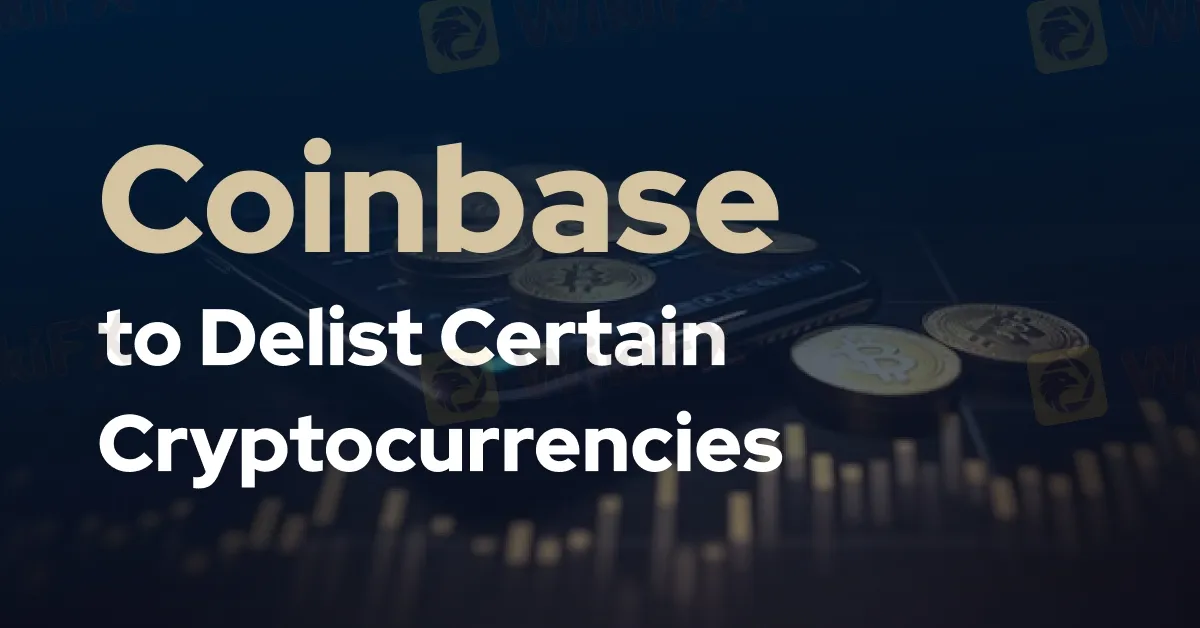简体中文
繁體中文
English
Pусский
日本語
ภาษาไทย
Tiếng Việt
Bahasa Indonesia
Español
हिन्दी
Filippiiniläinen
Français
Deutsch
Português
Türkçe
한국어
العربية
Coinbase to Delist Certain Cryptocurrencies
Abstract:Coinbase, a leading cryptocurrency exchange, has set the stage for removing several prominent cryptocurrencies from its platform, sparking discussions within the crypto community about the rationale behind these decisions and their potential implications.

Starting March 29, a roster of notable assets, including OMG Network (OMG), Augur (REP), Rally (RLY), Mirror (MIR), Loom Network (LOOM), and DFI Money (YFII) will be bidding farewell to Coinbase's trading platform. The trading curtain falls, yet the avenue to withdraw these tokens will remain accessible.
The decision to part ways with these assets has ignited a hunger for conjecture within cryptocurrency, prompting discourse about the underlying motivations. While the degree of influence exerted by the Security Exchange Commission (SEC) remains ambiguous, Coinbase has underscored that delisting is harmonious with its unwavering dedication to upholding premium benchmarks for the assets gracing its platform.
Furthermore, the calendar marks September 6, 2023, as the day when BarnBridge (BOND), DerivaDAO (DDX), Jupiter (JUP), Multichain (MULTI), Ooki (OOKI), and Voyager (VGX) shall bid their farewell to Coinbase. A consequence of this egress is that these coins will forfeit their privileges to ensure Coinbase's pivotal services, casting a shadow on their ability to be traded on platforms such as Coinbase Pro, Coinbase Exchange, and Coinbase Prime.
As the cryptosphere peers through a lens of perplexity, with the veil of uncertainty hanging over Coinbase's verdict, the affected alternative coins experienced a steep plummet in valuation after this declaration.

Brian Armstrong, the luminary helming Coinbase, dispelled misconceptions surrounding the exchange's delisting determinations, debunking the notion of a game of “choosing victors and vanquished.” Instead, he revealed that reasonable scrutiny of assets transpires, contingent upon their adherence to the platform's baseline criteria for listing. These criteria encompass elements such as security and legality, encapsulating the essence of the appraisal process. Acknowledging the labyrinthine nature of evaluating nascent assets, Armstrong emphasized that the apparent bias in this selection process arises from the intricacy of assessment.
“Coinbase's mission is to usher aboard every legitimate and secure asset within the confines of the law, fostering not only a haven for our patrons but also an impartial arena for the profusion of novel crypto assets entering the fray,” he iterated.
Armstrong adroitly highlighted the expeditious trajectory of evaluating ERC-20 tokens, lauding their fidelity to the established Ethereum guidelines and facilitating their streamlined evaluation and seamless integration from a technical vantage point. Emanating from Ethereum's blueprint, ERC-20 tokens are meticulously engineered to adhere to standardized protocols.
Conversely, tokens functioning within disparate blockchain networks introduce a tapestry of technical intricacies and integration hurdles. Armstrong expounded that if the review and assimilation of such permits necessitate substantial effort, the preeminent American crypto exchange might be inclined to eschew their listing. This verdict refrains from passing judgment on the tokens' intrinsic worth or latent potential; instead, it embodies the pragmatic considerations and resources indispensable for efficacious incorporation.

Disclaimer:
The views in this article only represent the author's personal views, and do not constitute investment advice on this platform. This platform does not guarantee the accuracy, completeness and timeliness of the information in the article, and will not be liable for any loss caused by the use of or reliance on the information in the article.
Read more

Bybit Shuts Down NFT Marketplace Amid Crypto Market Downturn
Bybit announces the closure of its NFT marketplace, citing efforts to streamline offerings. Discover the latest trends in the declining NFT market and its shift to utility-based growth.

Galaxy Digital Settles $200M in Luna Token Manipulation Case
Galaxy Digital pays $200M to settle Luna token manipulation probe by NY regulators, linked to TerraUSD’s 2022 crash, impacting crypto market stability.

Vanuatu Passes VASP Act to Regulate Crypto and Digital Assets
Vanuatu's new VASP Act regulates crypto businesses, enforcing strict licensing, AML/CFT compliance, and investor protections.

Blockchain Decentralization: Empowering a Trustless Future
In recent years, blockchain technology has rapidly evolved from a niche innovation behind Bitcoin into a transformative force across industries. At its core, blockchain decentralization refers to the distribution of authority and decision-making away from a central entity and into the hands of a distributed network of participants. This shift redefines how data is stored and verified and paves the way for trustless, transparent, and resilient systems that challenge traditional centralized models.
WikiFX Broker
Latest News
Exposing the Top 5 Scam Brokers of March 2025: A Closer Look by WikiFX
Gold Prices Climb Again – Have Investors Seized the Opportunity?
Webull Launches SMSF Investment Platform with Zero Fees
Australian Regulator Warns of Money Laundering and Fraud Risks in Crypto ATMs
The Withdrawal Trap: How Scam Brokers Lure Victims into Paying More
FCA to Investors: Think Twice Before Trusting These Brokers
Trump\s tariffs: How could they affect the UK and your money
Trump gambles it all on global tariffs he\s wanted for decades
TradingView Brings Live Market Charts to Telegram Users with New Mini App
HTFX Spreads Joy During Eid Charity Event in Jakarta
Currency Calculator







